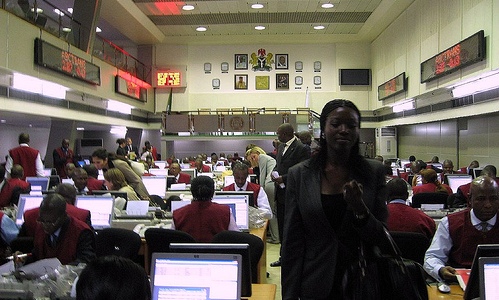Naira closes at two-week high
The naira closed at a two-week high against the dollar on Friday, as dollar sales by two oil companies and the Central Bank of Nigeria strengthened the naira by 0.38 per cent.
According to Reuters, the naira closed at N158.30 to the United States dollar, a level last seen on March 11, and firmer than Thursday’s close of N158.90. It rose to N157 intraday on Friday.
The naira has faced selling pressure in recent months from foreign investors exiting local bonds due to falling yields and from importers buying the dollar.
“The naira appreciated because of dollar sales by two energy firms and the CBN on Friday,” a dealer said.
French Total’s Nigerian unit sold $80m while Agip sold $8m, helping boost the naira. The CBN sold an unspecified amount of dollars to some lenders, traders said.
It was the CBN’s second direct intervention in the market in just over a week to calm the volatile naira and drain liquidity to check inflation, traders said.
Prior to intervening last Friday the CBN had been absent from the market for nearly a year as the currency had been relatively stable.
Foreign investors have been pulling out of local bonds as yields fell close to inflation levels after JP Morgan added Nigeria to its emerging debt index last October, putting pressure on the naira which has increased recently.
Traders expect the naira to strengthen further next week on the back of more dollar supply from oil companies as part of their month-end sale of hard currency to fund domestic obligations.
The yield on the country’s 16.39 per cent domestic bonds due January 2022 declined two basis points to 11.24 per cent in the secondary market while yields on the $500m of Eurobonds due January 2021 declined three basis points to 4.301 per cent.
For the ninth consecutive time, the CBN on Tuesday retained the Monetary Policy Rate, which is the benchmark interest rate in the country, at 12 per cent despite widespread expectations of a reduction.
Financial analysts had expected that the MPR would be reduced in order to bring down the interest rates within the system, in view of the declining inflation rate, which had remained within the single-digit band in the last two months.
However, Governor of the CBN, Mr. Lamido Sanusi, who briefed journalists at the end of the MPC meeting in Abuja, said the committee opted to retain the rate in order to sustain the gains of tight monetary policy while utilising the existing space in the corridor to influence yields and exchange rates in the short term.
( The Citizen )








